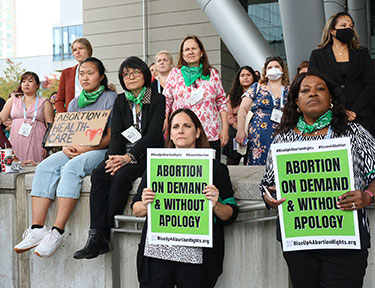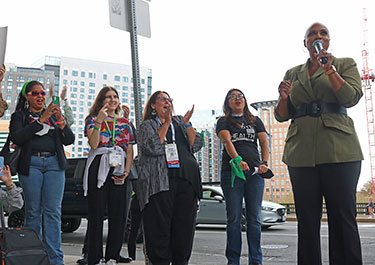Public health professionals and activists gathered outside APHA’s 2022 Annual Meeting and Expo to raise their voices in solidarity to send a clear message that reproductive justice is a vital component of public health.
The one-hour event, held outside the Boston Convention and Exhibition Center, united public health workers from across the country as they called for the right of women to make decisions regarding their own bodies. Many rally participants believe this right is at risk following the U.S. Supreme Court decision in Dobbs v. Jackson Women’s Health Organization, which overturned Roe v. Wade.
 Kaitlyn Shahvazian, Morgan DeLuce and Angela Li, from Harvard School of Public Health and the college’s Students for Choice Association, were at the rally. The students said they weren’t that concerned about reproductive justice in Massachusetts, but they are concerned about people in other states having limited access to abortion.
Kaitlyn Shahvazian, Morgan DeLuce and Angela Li, from Harvard School of Public Health and the college’s Students for Choice Association, were at the rally. The students said they weren’t that concerned about reproductive justice in Massachusetts, but they are concerned about people in other states having limited access to abortion.
“Massachusetts has much more accepting and accessible abortion laws compared to other states, and they’ve really proven how abortion is an extension of health care and people will continue to seek abortions regardless of whether they’re safe and legal,” Shahvazian said.
“It will only cause further health inequities by having stricter laws in different states,” DeLuce said. “Those who have privilege and have access to resources will be able to access abortion care and those who don’t won’t be able to.”
The rally was organized by multiple APHA Sections and Caucuses, including the Maternal Child Health Caucus, Medical Care Caucus, Black Caucus, Women’s Caucus, Peace Caucus, LGBT Caucus, Socialist Caucus and others. The rally featured four speakers: JudyAnn Bigby, former secretary of health and human services of Massachusetts; ob-gyn Carmen Nevarez, of the Public Health Institute; Isabella Villa Real Seabra, a student at Barnard College; and Ayanna Pressley, U.S. representative for Massachusetts’ 7th Congressional District.
Seabra was active in getting Barnard to provide abortions on the college’s campus. She said New York was supposed to be a safe haven for people seeking abortions; yet many people — particularly college students — may not have the resources to access abortion. Seabra said even if states do not allow abortion procedures, abortion pills are still available to be mailed to any state. Her goal is to urge New York state to require all public colleges to provide abortion pills on campus.
Pressley said she heard about the Supreme Court’s recent decision on Roe v. Wade while at her daughter’s eighth-grade graduation ceremony. She said she began that day feeling optimistic about her daughter’s future, but then became fearful about the world her daughter would grow up in.
Pressley commended the rally attendees for taking the time and effort to effect change.
“The most effective way to be in resistance and advance progress is to join a movement,” Pressley said, looking out over the crowd. “And boy, does this look like a movement.”
Milton Kotelchuck, an APHA member of 25 years and a member of the Maternal and Child Health Section, handed out flyers that included a list of actions people could take for reproductive justice.
“We want the public health community to say, as a community, that we’re really opposed to the way the Supreme Court ruled on this and that there are a lot of different things that we can do and we need to do, particularly voting on Tuesday,” he said. The rally was held two days before the U.S. general election. “That’s why we wanted to have this demonstration today and not later.”
APHA supports reproductive justice and has been actively speaking with the media, members of Congress and others in its continued fight to protect access and rights to reproductive health services. APHA encourages everyone to urge their members of Congress to protect abortion and support the Women’s Health Protection Act.
Photos by Michele Late, The Nation's Health.